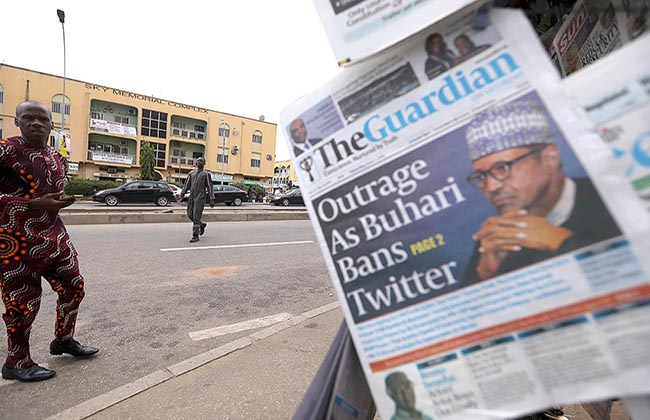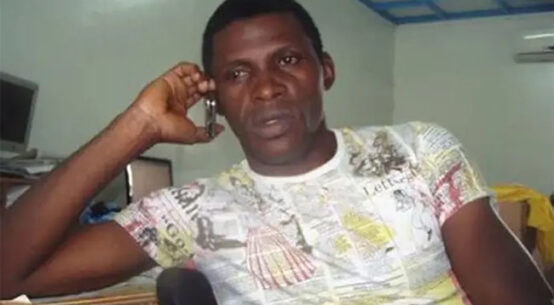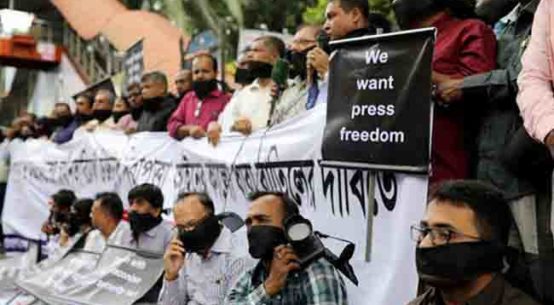
Despite sustained advocacy by campaigners for leaders to respect people and media rights to flourish as espoused under democratic tenets, the media remains under threat globally.
With the media grappling to remain relevant to society- being a mirror of society, the use of social media by practitioners and other end users is under threat as most global leaders are seemingly at war and want to swiftly stifle free flow of information to satisfy their ego.
Incidentally, there is increasing use of social media with consumers averaging 4.5 billion globally, representing half the world’s population with numbers likely to double.
Although social media is more easily accessible on various applications than before, some countries and regions feel challenged by the freedom of people and want a quick fix.
They have now waged a war and are fighting rigorously to the freedom granted to many people to access twitter, instagram, Facebook, tik tok, among others to communicate and want these facilities out rightly banned.
Nigeria is a case in point, until a few days ago after seven months of total twitter ban, the West African state justifies the ongoing psychological warfare buffeting the world. Authorities there are just lifting a ban it slapped on twitter arguing that it was interfering in operations of the state.
Authorities had last June acted unilaterally after a social media firm deleted a tweet by President Muhammadu Buhari, accusing it of siding with secessionists and allegedly being unethical, fueling outcries from interest groups .
Analysts and economic commentators argue over the ban and if sustained, may further weaken the economy and increase the already high unemployment levels for young people.
The ban was estimated to be losing about $250,000 (£176,000) each hour with the imposition.
The federal government had based its decision on the “persistent use of the platform for activities that are said to be capable of undermining Nigeria’s “corporate existence.” It demanded twitter be used strictly for business, a decision frowned upon.
“Those of us in the fields for 30 months, who went through the war, will treat them in the language they understand,” Mr. Buhari warned in the tweet that was taken down.
Nigeria’s Information Minister Lai Mohammed was dismissive of Twitter’s action, arguing: ‘Mr. Buhari had the right to express dismay at violence by a banned organisation’.
“Twitter may have its own rules, it’s not the universal rule,” he said. “If Mr. President anywhere in the world feels very bad and concerned about a situation; he is free to express such views.”
Twitter is popular with many Nigerians and helps in many ways including reaching vulnerable people; the platform has been used to raise funds for the sick, summon ambulances, help locate missing people and has been a source of livelihood for many of the country’s young people.
Arguably, twitter remains a powerful mobilising tool in the more than 210 million-populated state. Small businesses use the platform to reach their customers.
Activists too maximized the Twitter App to rally support during last year’s protests against police brutality under the hashtag #EndSars, which gained global attention and were backed by superstars such as Rihanna, Kanye West and boxer Anthony Joshua.
Despite the ban, many Nigerians defiled the directive had continued to access the site through Virtual Private Networks (VPNs), although most corporate organisations, including many media outfits, had obeyed the government’s order.
However, after months of differences and protests by consumers of the App, Nigerian authorities and Twitter management are dialoguing and agreed to resume the App operation in that country, but conditionally.
The US-based social media company is expected to, among other conditions, register itself in the country as a show of commitment, according to that country’s information and technology development agency.
The Twitter giant should establish an office in the country and open a local office, appoint a country head and pay domestic taxes, according to Kashifu Inuwa Abdullahi, director general of the National Information Technology Development Agency.
The firm had “agreed to act with a respectful acknowledgment of Nigerian laws and the national culture and history on which such legislation has been built and work with the FGN [federal government of Nigeria] and the broader industry to develop a code of conduct in line with global best practices, applicable in almost all developed countries.”
A spokesperson for the social media company pledged unflinching commitment to abide by the law and ensure the App is not abused adding:
“We are pleased that Twitter has been restored for everyone in Nigeria. Our mission in Nigeria & around the world is to serve the public conversation. We are deeply committed to Nigeria, where Twitter is used by people for commerce, cultural engagement, and civic participation.”
The move restores access to the platform for Nigerian internet users, estimated at 140.41 million as at November 2021, a report from the Nigerian Communications Commission (NCC) says.
But global threats on the appreciation of social media remain about. China, Turkey, Uganda, North Korea, Cuba, are among countries that are seemingly “allergic to Social Media” and have imposed various restrictions on Apps.
This, apparently, has heightened threats to the growth of freedom of speech and social media growth, though unstoppable with the emerging of the global village.
Chinese authorities have blatantly cut off twitter, facebook and YouTube as ‘because companies want to keep their data secret from the Chinese government, perceived as a violation of business etiquette’. They are now forbidden to do business in China unless one follows the law to the latter.
China is among the eight other countries where repressive governments have imposed a ban on Twitter since 2009. The action was taken after a “small group of China’s Muslim ethnic minority used the site to exchange information which resulted in deadly riots in Xinjiang.”
Since then many Chinese have accessed Twitter via VPN. Twitter was officially blocked alongside Facebook, Google+ and Foursquare. Arguably, as of 2019, China, Iran, North Korea, Cuba, Turkmenistan were rated amongst others that sought to block Twitter either temporarily or permanently in their domains.
Turkey
Turkey blocked access to Twitter in March 2014 in the run-up to local elections.
The move was reportedly carried out to stem a stream of leaked wiretapped recordings of senior officials that had appeared on the site, prompting then Prime Minister Tayyip Erdogan to say he would “root out” the network.
Turkey lifted the ban on Twitter after the social networking site complied with its request to remove photographs of a slain Istanbul prosecutor.
The decision caused a public uproar and drew heavy international criticism. Twitter said the government of Turkey since 2017 accounted for more than 52 per cent of all content removal requests worldwide.
Egypt
Egyptians had no access to Twitter on January 25, 2011 during the 2011 Egyptian protests. Various reports claimed that access to the entire Internet from within Egypt had been shut down.
By February 2, 2011, connectivity was re-established by the four main Egyptian service providers.
In 2016, Egypt cut off internet sites such as Twitter and Facebook as the government tried to prevent social media from being used to foment unrest. Twitter, YouTube, Hotmail, Google, Chinese search engine Baidu and a “proxy service” – which would allow users to evade the restrictions – appeared to be blocked from inside the country, according to the UK guardian.
Iran
Twitter was blocked in Iran in 2009 after a contentious presidential election. During the period, only Iranian President Hassan Rouhani was not prevented from owning a Twitter account, reports say.
An estimated two million Iranians access Twitter using VPNs, and Twitter was integral in galvanizing support for Iran’s 2010 Green Revolution.
North Korea
North Korea officially announced it was blocking Facebook, YouTube, Twitter and South Korean websites in a bid to further control access to outside information in 2013.
The government announced it was blocking the aforesaid platforms “for a certain period of time.” It also said gambling and “sex and adult websites” had been blocked. In 2010 the government surprised the world by reportedly starting its own Twitter account. South Korea, in response, blocked the account from its own borders.
It’s widely argued that North Korea, like in most other countries, chiefly in developing or Least Developed Accessing Twitter without the government’s permission is a punishable offense. This applies to both citizens and foreigners.
Saudi Arabia
In 2013, the Saudi Arabian government blocked Twitter when it conducted an “experiment “. The app was an important tool for criticizing the government.
It also censors individual social media pages, blocks accounts of political activists, and curbs freedom of expression by using tweets as grounds for charges like defamation and blasphemy.
Turkmenistan
Foreign news and opposition websites have been blocked in Turkmenistan since 2018. Social networks like Twitter are usually described as “often inaccessible”.
UAE
In 2007, the UAE blocked Twitter, meaning anyone in the UAE who went to the site was welcomed with the following message:
“We apologize; the site you are attempting to visit has been blocked due to its content being inconsistent with the religious, cultural, political and moral values of the United Arab Emirates.” But Twitter has since been available in the country.
Africa too, despite embracing democracy, many countries have developed “goose pimples” over social media, where press freedom and civil liberties of media practitioners are being trampled upon as countries seek to entrench authoritarian rule.
Many, chiefly in the Southern African region, seek to hasten the implementation of cyber security related laws by the 16-Southern African Development Community (SADC) member states.
The press is concerned that at the rate the various countries are seeking to enact the laws, and fear that the actions could stifle freedom of expression, access to information and media freedoms enjoyed by practitioners, despite being a strategic partner for socio-economic development.
Press freedom campaigners have petitioned the Southern Africa Development Community, President Filipe J. Nyusi, also President of the Republic of Mozambique over increasing threats on media freedom in the region and are seeking urgent restraint to avert the media veering off course from being the mirrors of society.
Media Institute of Southern Africa (MISA) formed in 1992, has raised a red flag and is concerned at the speed at which countries seek to regulate the media, fearing that and if objective is attained, it would ultimately alienate the “fourth estate” from society.
This comes after regional leaders had resolved during the SADC Heads of State and Government Summit hosted in the Mozambique capital, Maputo in 2020 to implement without delay contentious cyber security laws.
MISA is concerned, if allowed unilaterally, could allow Governments to snoop on the Internet without much attention and due regard to the enjoyment of fundamental human rights, particularly the protection of citizens’ right to privacy. The media is one of the victims too.
MISA seeks the regional body to censure its member countries and change their ‘appetite’ to stifle the media through uncouth practices, according to Golden Maunganidze-the MISA Regional Governing Council Chairperson in his petition to the SADC head.
It urges SADC to ensure that the region’s cyber security regulation is informed by the revised principles of the ACHPR Declaration on Freedom of Expression and Access to Information which recognises the Internet as a fundamental right.
Currently, MISA has fully operational Chapters in eight (8) SADC countries: Botswana, Lesotho, Malawi, Eswatini, Mozambique, Tanzania, Zambia and Zimbabwe. The other Chapters in Angola and South Africa operate at reduced levels of activity.




